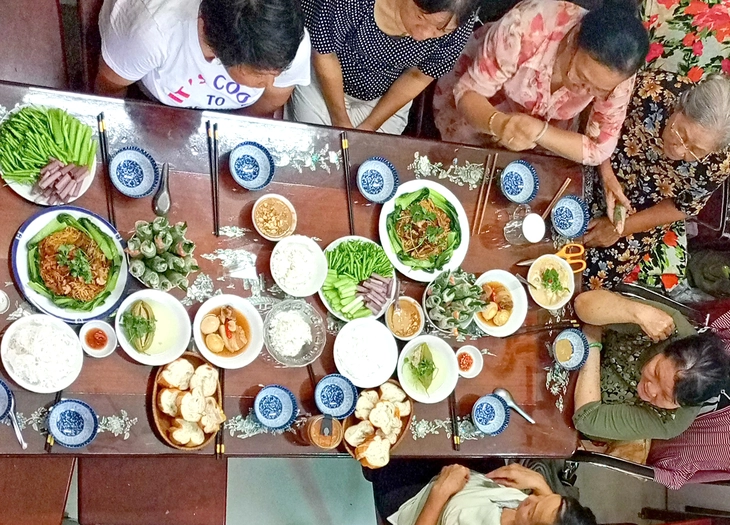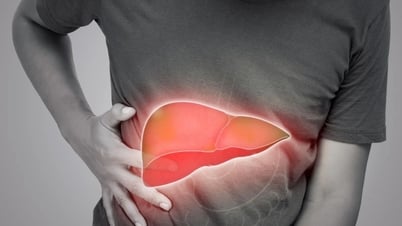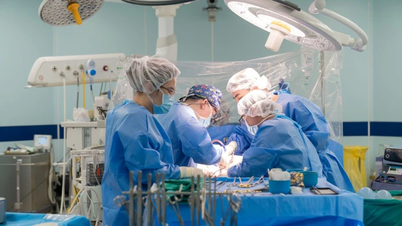
A meal is considered nutritious and should have a variety of foods in appropriate proportions - Photo: T.D.
How do we eat to be healthy?
No food is perfect
According to nutritionists, a healthy meal for each person to live happily and healthily every day must be listened to, understood and meet the body's nutritional needs just enough, not too little or too much.
Providing too little or too much nutrition can have a negative impact on your health. Providing a balanced, varied, and adequate diet is still the most important.
Talking about the perspective of nutritional meals, specialist doctor Danh Thi My Phuong - nutrition department of Can Tho Children's Hospital - said that there is no food or food group that is the most perfect for human life, growth and development.
Therefore, a meal is considered to be nutritionally adequate and requires a variety of foods in appropriate proportions. Adequate is a general term, but it still depends on the current needs of each person and on each person's stage of development.
For example, infants and young children will have different needs than adults, or pregnant women, the elderly, people with special medical conditions... will also have separate needs. There is no perfect diet, nor is there a single point of view that is completely right or completely wrong in providing nutrition.
Nutritional provision must be based on the actual needs of the individual, depending on many factors such as health status, developmental stage related to growth and development needs, constitution, socio -economic conditions, etc.
Doctor Tran Ba Thoai, member of the Executive Committee of the Vietnam Endocrinology - Diabetes Association, believes that in nature, no food is perfect. Therefore, a reasonable diet ensures adequate and balanced intake of all four main groups in the "food square": carbohydrates, protein, fat, vitamins and minerals.
Nowadays, there are many popular diets: from DASH (reduce salt, reduce bad fats; increase vegetables, low-fat milk), keto and low-carb (cut starch, increase protein and fat), intermittent fasting (like 16/8, 5:2, OMAD...) to vegetarianism, macrobiotics, eat clean, Mediterranean, Japanese style, Chinese style...
Each mode has its own advantages and disadvantages, depending on each person's physical condition and goals.
According to the definition of the World Health Organization (WHO), a healthy meal is a meal that ensures adequate and balanced intake of essential nutrients, including: protein, fat, starch, vitamins, minerals and fiber.
Not only focusing on quantity, the important factor is also the quality of each ingredient, ensuring diversity and food hygiene and safety.
What kind of food?
Doctor Le Thi Huong - Head of Nutrition Department, Can Tho Central General Hospital - shared that it can be said that no food is completely good, nor is there any food that is completely bad.
First of all, we eat to ensure adequate energy supply, not lacking but also not exceeding needs.
Next is to ensure a balance in the ratio of energy-generating nutrients: protein, lipid, glucid. The ratio of these substances varies depending on different subjects, but you should not eat a diet that provides energy entirely from only one food group.
Balancing the number of meals and the energy ratio between meals during the day helps the body to always have a balanced level of energy, not lacking when doing a lot of activity, not having excess when doing little activity.
According to Dr. Huong, in an era where nutrition plays an increasingly important role in human health, many diets have been created to meet different needs such as weight loss, disease control, and overall health improvement...
However, no diet is perfect for everyone. Choosing the right diet should be based on your individual physical condition, health status and specific goals.
According to nutritionists, from a nutritional perspective, no food is inherently "good" or "bad" - what matters is how much we eat, when we eat it, what we eat it with, how often we eat it... and whether the overall portion is healthy.
Experts agree that a healthy diet is not about one specific dish, but rather about a combination that suits each person's health, culture and lifestyle.
The most basic and important principle is to ensure that the food selection principle is to ensure hygiene, safety, and clear origin. Before eating, it must be carefully prepared and should be eaten immediately after preparation.
Each person should balance and eat a varied diet, with just enough of the necessary nutrients for the body's needs. However, there is no general formula, depending on each physical condition and each stage of development, nutritional needs are different, so there should be a suitable individual nutritional regimen, Dr. Phuong emphasized.
Building healthy eating habits doesn’t have to start with big changes. The simplest is to reduce the amount of sugar, salt and fat in your daily meals, prioritize fresh foods, and limit processed foods and sugary drinks.
Limit alcoholic beverages, beer, carbonated drinks, and cigarettes because they only provide empty calories and do not provide real nutrition and also cause long-term harm - experts recommend.
Is food the cause of disease?

Meals should have green vegetables - Photo: TRI DUC
According to Dr. Huong, avoiding the accumulation of excess energy reserves in the body can cause illness. Eating too much or too little of a certain food group is not good for the body. Energy needs depend on age, gender, physiological condition, illness and daily physical activity.
In the current development context, the rate of non-communicable diseases such as cardiovascular disease, diabetes and obesity is increasing, building a reasonable and healthy diet is becoming a top concern of many people.
A survey conducted by the National Institute of Nutrition in 2023 showed that more than 65% of Vietnamese adults tend to consume energy-rich but nutrient-poor foods.
The development of the food industry, the overconsumption of fast food with eye-catching and convenient images, bottled soft drinks, beer and wine, etc. also leads to many long-term health consequences for consumers - Dr. Huong emphasized.
Healthy meal
Our views on healthy eating and healthy food have changed dramatically today.
It doesn't matter what we eat, but more importantly, in a healthy meal, we should mention the atmosphere of the meal. A cozy meal, gathered with family and loved ones also helps us feel more comfortable and happy, at this time the digestive system will work better... - nutrition experts recommend.
Nowadays we are eating too much fat, protein, sugar, chemically contaminated food... in our daily meals. Is this the cause of diabetes, cancer, heart disease, obesity...
According to Dr. Danh Thi My Phuong, this is not entirely true, but many studies have shown that consuming too much energy compared to needs, along with an unbalanced diet, are risk factors for the above chronic diseases.
The rate of these diseases is also increasing rapidly worldwide, including in Vietnam.
Source: https://tuoitre.vn/nen-an-theo-dinh-duong-hay-an-theo-so-thich-20250422221317088.htm


![[Photo] Readers line up to visit the photo exhibition and receive a special publication commemorating the 135th birthday of President Ho Chi Minh at Nhan Dan Newspaper](https://vphoto.vietnam.vn/thumb/1200x675/vietnam/resource/IMAGE/2025/5/17/85b3197fc6bd43e6a9ee4db15101005b)
![[Photo] Prime Minister Pham Minh Chinh chairs meeting on science and technology development](https://vphoto.vietnam.vn/thumb/1200x675/vietnam/resource/IMAGE/2025/5/17/ae80dd74c384439789b12013c738a045)
![[Photo] More than 17,000 candidates participate in the 2025 SPT Competency Assessment Test of Hanoi National University of Education](https://vphoto.vietnam.vn/thumb/1200x675/vietnam/resource/IMAGE/2025/5/17/e538d9a1636c407cbb211b314e6303fd)























![[Photo] Nearly 3,000 students moved by stories about soldiers](https://vphoto.vietnam.vn/thumb/1200x675/vietnam/resource/IMAGE/2025/5/17/21da57c8241e42438b423eaa37215e0e)





































































Comment (0)